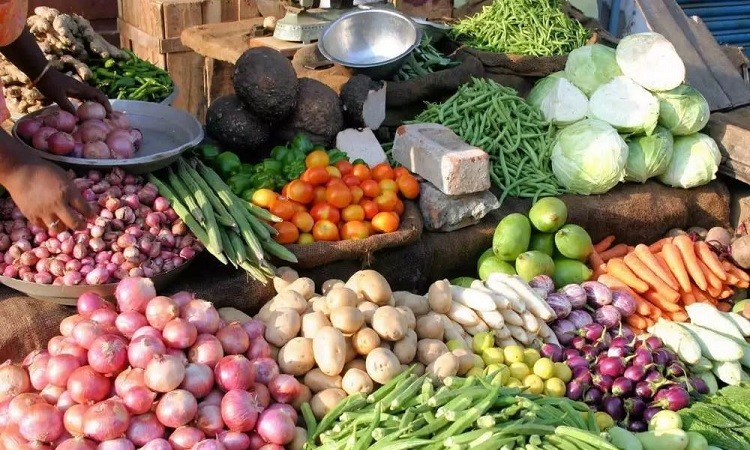
NEW DELHI: The Ministry of Finance stated on Tuesday that the temporary price pressure on food items is expected to ease, with a decline in tomato prices. However, the government and the RBI need to enhance their vigilance to address the elevated inflationary pressures.
The current fiscal's increased allocation for government capital expenditures is now leading to the private sector investing more, and growth is anticipated to continue being driven by domestic consumption and investment demand, according to the Monthly Economic Review for July released by the ministry.
Retail inflation, as measured by the consumer price index, surged to a 15-month high of 7.44% in July 2023, primarily due to specific food commodities. Meanwhile, core inflation remained low at 4.9% over a 39-month period.
The report noted, "The government has already taken proactive measures to control food inflation, which, combined with the influx of fresh supplies, is expected to ease market price pressures soon. The transitory nature of the price pressure in food items is anticipated." However, global uncertainty and disruptions in the domestic scenario could sustain elevated inflation for the next few months, necessitating heightened attention from both the government and the RBI.
Although July's food inflation might be the third highest since the introduction of the new CPI series in 2014, only 48% of food items experienced inflation above 6%, including 14 food items with double-digit inflation.
Certain items like tomatoes, green chillies, ginger, and garlic saw inflation rates exceeding 50%, contributing to the high food inflation in July 2023.
The report projected that tomato prices are likely to decrease with the arrival of fresh stocks by the end of August or early September. Additionally, increased imports of tur dal are expected to moderate the inflation of pulses. These factors, combined with recent government actions, could lead to a reduction in food inflation in the upcoming months.
Looking ahead, domestic consumption and investment demand are predicted to sustain growth, but uncertainties on the global and regional fronts, along with domestic disruptions, might keep inflation pressures elevated for the foreseeable future. Thus, the government and the RBI are advised to remain vigilant.
The surge in cereal prices was attributed to Russia's termination of the Black Sea Grain deal and unfavorable conditions in major wheat-producing regions. In India, factors like the white fly disease and uneven monsoon distribution affected vegetable prices.
In July, cereals, pulses, and vegetables experienced double-digit inflation compared to the same period the previous year. Domestic production disruptions exacerbated inflation pressures. White fly disease in the Kolar district of Karnataka and swift monsoon arrival in northern India disrupted tomato supply chains, resulting in price hikes. A deficient kharif season in 2022-23 led to increased tur dal prices.
The RBI's Monetary Policy Committee decided to maintain policy rates and focus on gradually withdrawing accommodation to align inflation with the target while supporting growth.
The committee expected vegetable prices to correct in the coming months but highlighted uncertainties in the domestic food price outlook due to sudden weather events, potential El Nino conditions, and rising global food prices. As a result, the MPC adjusted its inflation projection for the current fiscal year from 5.1% to 5.4%.
Cumulative rainfall till August 18, 2023, during this year's southwest monsoon season was deficient by around 6% compared to the long-term average. As of August 18, 2023, farmers had sown 102.3 million hectares, similar to the same period the previous year, and 1.1% higher than the average of the last five years.
The finance ministry's Department of Economic Affairs monthly report highlighted the agricultural sector's growing momentum, attributed to progress in monsoons and kharif sowing. Wheat and rice procurement advanced, boosting food grain buffer stocks for national food security.
Regarding investment, the report underlined the government's emphasis on capital expenditure to drive future growth. The FY24 budget raised capital outlay by 33.3%, increasing the share of capital expenditure in total spending from 12.3% in 2017-18 to 22.4% in 2023-24 (BE).
The report noted, "The increased provision for government capital expenditure is now attracting private investment, evident in various high-frequency indicators and industry reports signaling the emergence of a private capex upcycle." The government's efforts to stimulate private sector investment include the Production-Linked Incentive (PLI) scheme and initiatives like PM Gati Shakti and the National Infrastructure Pipeline (NIP) to promote private-sector involvement in new infrastructure projects.
Looking ahead, the report projected that the PLI scheme and new-age sectors (such as green hydrogen, semiconductors, wearables, and solar modules) are expected to contribute around 17% of capital expenditures between FY13 and FY27.
"The strong financial position of the private sector, coupled with increased government capex, is anticipated to provide more opportunities for private sector participation in diverse infrastructure initiatives. Manufacturing sector capacity utilization is now above its historical average, indicating the need for additional capacity creation as demand sustains the domestic economy," the report concluded.